
Acta Scientiarum Polonorum-Technologia Alimentaria
Scope & Guideline
Transforming Knowledge into Action in Food Science
Introduction
Aims and Scopes
- Food Safety and Quality Assessment:
Research aimed at evaluating the safety, quality, and sensory attributes of food products, including studies on contaminants, preservation techniques, and quality assurance methodologies. - Nutritional Science and Health Benefits:
Investigations into the nutritional composition of food products, their health benefits, and the impact of dietary components on health, including studies on functional foods and bioactive compounds. - Food Processing and Technology Innovations:
Studies focused on innovative processing techniques, including fermentation, extraction, and encapsulation methods aimed at improving food quality and functionality. - Functional Foods and Nutraceuticals:
Research on the development and evaluation of functional foods that provide health benefits beyond basic nutrition, including the study of phytochemicals, probiotics, and dietary supplements. - Sustainable Food Production and Waste Utilization:
Research exploring sustainable practices in food production, including the utilization of by-products and waste materials in food formulations and the assessment of their environmental impact.
Trending and Emerging
- Bioactive Compounds and Functional Foods:
An increasing number of studies focus on the identification and application of bioactive compounds in foods that provide health benefits, reflecting a growing interest in functional foods and nutraceuticals. - Innovative Processing Technologies:
There is a notable trend towards exploring innovative food processing technologies, such as ultrasound-assisted extraction and microwave applications, which enhance food quality and nutritional value. - Sustainable Practices in Food Technology:
Research emphasizing sustainability, including the use of by-products, waste reduction, and environmentally friendly production methods, is on the rise, reflecting global concerns about food sustainability and environmental impact. - Health Impacts of Dietary Patterns:
Emerging themes include the investigation of dietary patterns and their health impacts, particularly concerning chronic diseases and metabolic health, highlighting the journal's focus on nutrition-related research. - Probiotics and Gut Health:
An increase in publications related to probiotics, their health benefits, and their application in food products indicates a growing interest in gut health and its connection to overall well-being.
Declining or Waning
- Traditional Fermentation Techniques:
While fermentation remains a topic of interest, the focus on traditional methods appears to be declining in favor of more innovative and technologically advanced fermentation processes. - Basic Food Chemistry Analyses:
Research that solely concentrates on fundamental chemical analyses of food components is becoming less frequent, suggesting a shift towards more applied research with practical implications for food technology. - Single-Ingredient Studies:
There is a decreasing emphasis on studies that focus exclusively on the properties or benefits of single food ingredients, as the trend moves towards more complex formulations and multi-ingredient products.
Similar Journals

Journal of Food Measurement and Characterization
Innovating Insights in Food CharacterizationJournal of Food Measurement and Characterization, published by SPRINGER, is a pivotal resource for researchers and professionals in the fields of Chemical Engineering, Food Science, and Industrial and Manufacturing Engineering. With an ISSN of 2193-4126 and an E-ISSN of 2193-4134, this esteemed journal has carved its niche since its inception in 2012, continuing to contribute valuable insights until 2024. Ranking in the Q2 category across multiple disciplines, including Safety, Risk, Reliability, and Quality, it reflects a strong commitment to advancing knowledge and innovation within these critical areas. Although it operates under a subscription model, the journal provides an array of access options for institutions and researchers keen to explore novel methodologies and analyses in food measurement and characterization. The journal’s rigorous peer-review process ensures the dissemination of high-quality research, making it an essential platform for advancing the science of food and related industries.

Journal of Food Science and Technology-Ukraine
Enhancing Nutritional Quality Through Cutting-Edge ResearchJournal of Food Science and Technology-Ukraine, published by the Odesa National University of Technology, stands as a pivotal platform dedicated to the dissemination of high-quality research in the field of food science and technology. With its open access policy established in 2014, the journal fosters global knowledge sharing and accessibility, enabling researchers, professionals, and students to access critical findings and advancements in food technology without barriers. The journal's commitment to publishing innovative studies, reviews, and case analyses reinforces its role in addressing contemporary challenges in food safety, preservation, processing, and nutritional quality. With ISSN 2073-8684 and E-ISSN 2409-7004, it serves as a valuable resource for the academic community, supporting the advancement of food science knowledge and its practical applications.
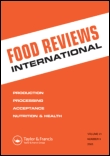
FOOD REVIEWS INTERNATIONAL
Transforming Research into Practical Solutions for the Food IndustryFOOD REVIEWS INTERNATIONAL, published by Taylor & Francis Inc, serves as a pivotal resource within the fields of Food Science and Chemical Engineering. Established in 1985, this esteemed journal offers a comprehensive platform for the dissemination of critical reviews that enhance understanding and innovation in the food industry. With an impressive impact factor reflecting its Q1 quartiles in both Food Science and Chemical Engineering categories, it ranks among the top journals in Scopus, securing the 24th spot in Agricultural and Biological Sciences. Scholars, researchers, and professionals are encouraged to explore its rich content, which spans meticulously reviewed articles that bridge academic research and practical applications, while contributing to advancements in food safety, processing, and sustainability. Although not an Open Access journal, access to its extensive repository is vital for anyone aiming to stay at the forefront of food science advancements.
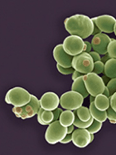
Annual Review of Food Science and Technology
Bridging Research and Application in Food ScienceThe Annual Review of Food Science and Technology, published by ANNUAL REVIEWS, is an esteemed journal dedicated to advancing the knowledge within the field of food science. With an impressive Q1 ranking in the Food Science category, and ranking as #6 out of 389 in the Scopus Agricultural and Biological Sciences category, the journal serves as a vital resource for researchers, professionals, and students. This publication encapsulates comprehensive reviews and cutting-edge research, helping to bridge the gap between research and practical application. Though it does not offer Open Access, it provides valuable insights into various aspects of food science from 2010 to 2024, ensuring that its readership stays at the forefront of emerging trends and innovations. The journal's focus on high-quality, peer-reviewed articles makes it a critical platform for scholars looking to deepen their understanding and contribute to this rapidly evolving field.
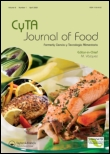
CyTA-Journal of Food
Empowering knowledge sharing in food science.CyTA-Journal of Food is a prestigious academic journal published by TAYLOR & FRANCIS LTD, dedicated to advancing the field of food science and technology through the dissemination of innovative research and practical knowledge. With an ISSN of 1947-6337 and an E-ISSN of 1947-6345, this journal stands out with its strong impact factor and is currently placed in the Q2 quartile across multiple categories, including Chemical Engineering, Chemistry, and Food Science, making it a vital resource for researchers and professionals alike. The journal has been an integral part of the academic community since its inception in 2009, and continues to publish cutting-edge articles through to 2024. Its alignment with Scopus ranks further signifies its influence, notably achieving 67th percentile in Industrial and Manufacturing Engineering. As an Open Access journal, it ensures widespread accessibility to its valuable content, promoting collaboration and knowledge sharing among scientists, engineers, and students dedicated to enhancing food safety, quality, and sustainability.

eFood
Elevating food research for a healthier tomorrow.eFood is a pioneering journal in the field of food science, published by the esteemed WILEY. With its impactful emergence, the journal has rapidly established itself within the academic community, evidenced by its impressive Q1 category ranking in Food Science as of 2023, and a commendable position at Rank #95 out of 389 in the Scopus database. Covering a wide spectrum of topics related to food innovation, technology, safety, and nutrition, eFood serves as an indispensable platform for researchers, industry professionals, and students who are at the forefront of advancing our understanding of food systems. The journal notably operates with an open-access model, promoting wide dissemination of knowledge while enhancing the visibility of high-quality research. As we look forward to converging years from 2020 to 2024, eFood is poised to foster rigorous scientific discourse and contribute significantly to the future of food science research.
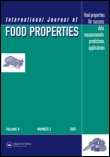
INTERNATIONAL JOURNAL OF FOOD PROPERTIES
Pioneering studies for a sustainable food future.INTERNATIONAL JOURNAL OF FOOD PROPERTIES, published by TAYLOR & FRANCIS INC, is a leading platform for disseminating high-quality research in the field of food science. With an ISSN of 1094-2912 and E-ISSN of 1532-2386, this journal has been committed to open access since 2018, ensuring that groundbreaking studies are readily available to global audiences. The journal has steadily gained recognition for its contribution to the discipline, achieving a Q2 ranking in Food Science and placing in the 68th percentile among its peers according to Scopus metrics. Covering a wide array of topics related to the properties and applications of food, it serves as a valuable resource for researchers, professionals, and students alike. With coverage extending from 1998 to 2024, the journal continually seeks to advance knowledge and foster innovation within the food science community, making it a pivotal publication for anyone serious about this vital field.
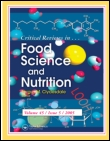
CRITICAL REVIEWS IN FOOD SCIENCE AND NUTRITION
Illuminating Innovations in Food ResearchCRITICAL REVIEWS IN FOOD SCIENCE AND NUTRITION, published by Taylor & Francis Inc, is a premier peer-reviewed journal dedicated to advancing the understanding of food science and nutrition. With its ISSN 1040-8398 and E-ISSN 1549-7852, this influential journal has established itself as an essential resource in the field, featuring high-quality reviews and critical analyses that foster innovation and knowledge sharing among researchers, practitioners, and academics. Recognized as a Q1 journal in Food Science, Industrial and Manufacturing Engineering, and Medicine (miscellaneous) for 2023, it ranks impressively within the top percentiles of its respective fields, making it a valuable platform for impactful research. Although the journal does not currently offer open access, it continues to attract a readership eager to explore the intricacies of food science and its applications, thereby shaping future advancements in the industry. With an extensive history dating back to 1981 and convergence up to 2024, CRITICAL REVIEWS IN FOOD SCIENCE AND NUTRITION remains committed to providing comprehensive reviews that illuminate contemporary challenges and solutions in the domain of food science and nutrition.
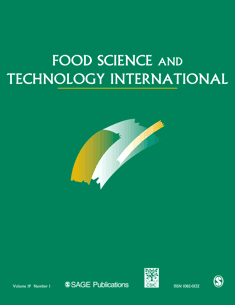
FOOD SCIENCE AND TECHNOLOGY INTERNATIONAL
Pioneering research for a sustainable food industry.FOOD SCIENCE AND TECHNOLOGY INTERNATIONAL, published by SAGE Publications Ltd, is a premier journal in the fields of food science and technology, serving as a crucial platform for the dissemination of innovative research and practical applications from 1995 through to 2024. With an impact factor reflecting its significant standing—ranking in the Q2 quartile for Chemical Engineering, Food Science, and Industrial and Manufacturing Engineering—this journal plays an instrumental role in advancing the interdisciplinary study of food systems. Researchers, professionals, and students can access high-quality contributions that address the latest developments and trends in food technology, safety, and processing. Located in the United States, FOOD SCIENCE AND TECHNOLOGY INTERNATIONAL also boasts commendable Scopus rankings, ensuring its articles are both relevant and widely cited within the academic community. As a vital resource for anyone engaged in food science research, этот журнал fosters knowledge sharing and innovation in the ever-evolving landscape of food technology.

ITALIAN JOURNAL OF FOOD SCIENCE
Elevating Global Knowledge in Food ScienceITALIAN JOURNAL OF FOOD SCIENCE is a distinguished open-access publication dedicated to advancing knowledge in the field of food science, catering to a global audience of researchers, professionals, and students. Published by Codon Publications in Singapore, this journal, operating under the ISSN 1120-1770 and E-ISSN 2239-5687, has been a vital platform for scholarly discourse since its inception in 1996, converging towards a comprehensive view of food science trends through 2024. With an impressive ranking in the third quartile (Q3) of the Food Science category and a Scopus rank of #151 out of 389, the journal plays a significant role in disseminating high-quality research, contributing to a richer understanding of food science within the agricultural and biological sciences. Since transitioning to open access in 2008, it has further expanded its reach, ensuring that innovative research is accessible to all, thereby fostering collaboration and knowledge exchange in this vital industry.